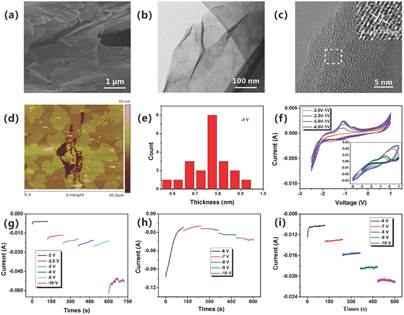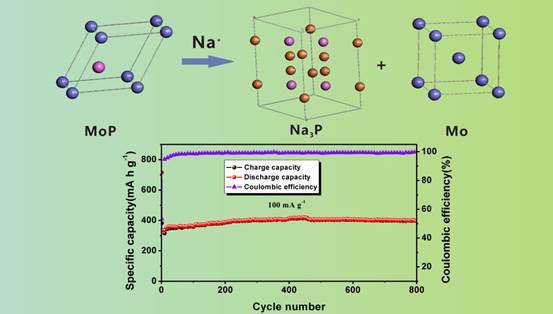Top international materials science journal Advanced Materials (IF=19.791) recently published the latest research achievement of the team led by Professor Ji Xiaobo at the College of Chemistry and Chemical Engineering of Central South University on the use of an electrochemical method to prepare phosphorene and its application in sodium-ion batteries, which is entitled “Layer-Tunable Phosphorene Modulated by the Cation Insertion Rate as a Sodium-Storage Anode” (DOI: 10.1002/adma.201702372), with Professor Ji Xiaobo as the corresponding author, Class of 2015 postgraduate Huang Zhaodong as the first author and Central South University as the first unit, csu.edu.cn reported.

Phosphorene (few-layer black phosphorous), focus of the post-graphene research, is of a folded 2D layered structure, and has been regarded as a promising material in the fields of photoelectricity, catalyst and new energy materials in recent years for its direct energy band gap, intralayer anisotropy and ultrahigh theoretical specific capacities of sodium-ion batteries. Currently, phosphorene is mainly prepared by means of the liquid phase exfoliation and the mechanical exfoliation, but deficiencies such as large time consumption, low efficiency and introduction of structural defects are major hurdles for the development of phosphorene in various research domains. Professor Ji Xiaobo’s team applied the electrochemical cathodic exfoliation method in phosphorene preparation for the first time, obtaining phosphorene with controllable layer number, large area and few deficiencies. The obtained phosphorene delivers superior electrochemical performance when used as an anode material in sodium-ion batteries. It has a specific capacity of 1500 mAh g-1 at a current density of 100 mAg-1 after 50 cycles, and can maintain a specific capacity of 600 mAh g-1 at a large current density of 1500 mA g-1 even after 100 cycles. This new efficient preparation method not only will promote the research and application of phosphorene-based materials and the development of electrochemical exfoliation technology, but also provides a new possibility for the preparation of monolayer 2D materials.
Moreover, Professor Ji Xiaobo team’s paper on the application of phosphide in sodium-ion batteries, which is entitled “Molybdenum Phosphide: a Conversion-Type Anode for Ultralong-Life Sodium-Ion Batteries” (DOI: 10.1021/acs.chemmater.7b02193), was recently published on the authoritative materials science journal Chemistry of Materials (IF=9.466), with Class of 2015 postgraduate Huang Zhaodong as the first author, Professor Ji Xiaobo as the corresponding author and CSU as the first unit.
Phosphides have been reckoned as promising anode materials for sodium-ion batteries in view of their high theoretical specific capacities and superior conductivity. Professor Ji Xiaobo team prepared molybdenum phosphide (MoP)/carbon composite nanorods by means of the modified high-temperature solid state method, and applied them for the first time in sodium-ion batteries. They also explored a conversion-type sodium storage mechanism of MoP by means of the in-situ XRD technology. The MoP/carbon composite electrode exhibits extraordinary electrochemical properties, including a specific capacity of 400 mAh g-1 at a current density of 100 mA g-1 after 800 cycles and a specific capacity of 104 mAh g-1 at a current density of 1600 mA g-1 after 10000 cycles, the best cycling stability ever reported.

Huang Zhaodong, Class of 2015 postgraduate at College of Chemistry and Chemical Engineering of CSU, is the first author of both works. Upon graduation, Huang Zhaodong joined Professor Ji Xiaobo’s research team as a recommended postgraduate. He has published 3 SCI An1 papers with a total impact factor of 34, and is now writing 1 paper. He has won many honors and rewards, including 2017 Jiana Student Entrepreneurship National Project, CSU’s 4th Outotec “Sustainable Development” Innovation Award, Excellent Project Conclusion & Best Paper Award of CSU Mittal Student Innovation and Entrepreneurship Project, Best Innovation Award of 2016 3rd Innovation Competition of IOT Intelligent Sensing, National Top Ten of 3rd Evonik Idea Contest China, Outstanding Student Award of 2016 BYD Scholarship and 2016 CSU Outstanding Postgraduate.
Paper links:
http://onlinelibrary.wiley.com/doi/10.1002/adma.201702372/full
http://pubs.acs.org/doi/pdf/10.1021/acs.chemmater.7b02193
Source: College of Chemistry and Chemical Engineering











